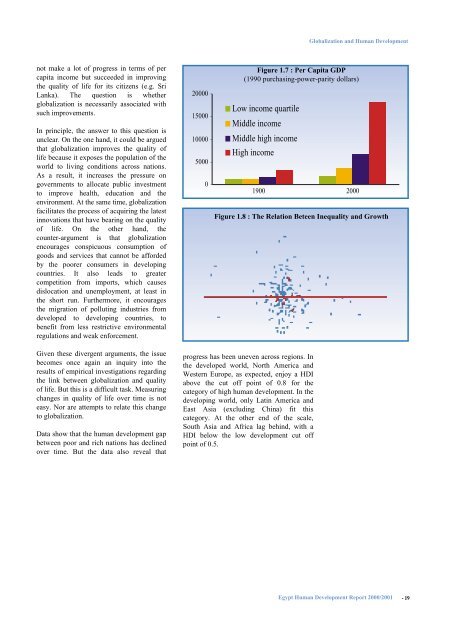Globalization and <strong>Human</strong> <strong>Development</strong>not make a lot of progress in terms of percapita income but succeeded in improvingthe quality of life for its citizens (e.g. SriLanka). The question is whetherglobalization is necessarily associated withsuch improvements.In principle, the answer to this question isunclear. On the one hand, it could be arguedthat globalization improves the quality oflife because it exposes the population of theworld to living conditions across nations.As a result, it increases the pressure ongovernments to allocate public investmentto improve health, education and theenvironment. At the same time, globalizationfacilitates the process of acquiring the latestinnovations that have bearing on the qualityof life. On the other hand, thecounter-argument is that globalizationencourages conspicuous consumption ofgoods and services that cannot be affordedby the poorer consumers in developingcountries. It also leads to greatercompetition from imports, which causesdislocation and unemployment, at least inthe short run. Furthermore, it encouragesthe migration of polluting industries fromdeveloped to developing countries, tobenefit from less restrictive environmentalregulations and weak enforcement.20000150001000050000Figure 1.7 : Per Capita GDP(1990 purchasing-power-parity dollars)Low income quartileMiddle incomeMiddle high incomeHigh income1900 2000Figure 1.8 : The Relation Beteen Inequality and GrowthGiven these divergent arguments, the issuebecomes once again an inquiry into theresults of empirical investigations regardingthe link between globalization and qualityof life. But this is a difficult task. Measuringchanges in quality of life over time is noteasy. Nor are attempts to relate this changeto globalization.Data show that the human development gapbetween poor and rich nations has declinedover time. But the data also reveal thatprogress has been uneven across regions. Inthe developed world, North America andWestern Europe, as expected, enjoy a HDIabove the cut off point of 0.8 for thecategory of high human development. In thedeveloping world, only Latin America andEast Asia (excluding China) fit thiscategory. At the other end of the scale,South Asia and Africa lag behind, with aHDI below the low development cut offpoint of 0.5.Egypt <strong>Human</strong> <strong>Development</strong> Report 2000/2001 - 19
Globalization and <strong>Human</strong> <strong>Development</strong>Box (1.2)Women and globalizationByThe National Council for WomenIn general, globalization has strengthenedwomen’s position. Their participation inmarket economy has also been fostered bythe tide of globalization. However, thisdevelopment has been uneven whetherbetween countries or among differentsocioeconomic groups within the samecountry. Indeed, globalization has also led tomore deepening of gender inequality onthese two levels.The issue of women and globalization is onethat concerns all mankind, men or women.The subject of globalization and its impacton women has been of considerable interestin most countries. The main objective of thefollowing paragraphs is to carry this subjectto the core of Egypt's interest in the genderissues.Tackling this question in different worksallover the world reveals that there are twoviews. The first considers that globalizationhas been a source of more pressures andresponsibilities on women, while the secondviews globalization as a source of severaladvantages for women. In fact, both trendsare bearing non-negligible traits of reality.On the one hand, globalization isincontestably a source of more pressures andresponsibilities on women due, among otherreasons, to:● Its negative impacts on the distribution ofincome among developed and developingcountries, socioeconomic strata within thesame country,● Its destructive impact on many traditionalemployment opportunities,● Its demonstration effect on consumptionespecially in the developing countries andamong the low-income and poor peopleall over the world,● Its concomitant socio-politicaldisturbances resulting from excessiveindividualism, regressive moral andspiritual values, and increasing marketaggressiveness especially towardsvulnerable countries and socioeconomicgroups within the same country, and● The proliferation of violence andcounter-violence resulting from its failure,till now at least, to attenuate the aggressive,and excessive, use of power at the differentsocietal levels, including the internationalcommunity.On the other hand, globalization is likely tobe advantageous for women given that:● It helps disseminate the gender cultureallover the world,● It fosters the development of nongovernmentalorganizations and actions thatcould help defend the cause of womenwherever gender inequalities work againstthem for whatever reason,● It provides a world-wide exchange of genderdata, information, and experiences,● It involves transformation in employmentqualifications and skills in such a way thatincreases women's opportunities in the labormarket, and● It calls forth the empowerment of women tomobilize all human resources to meet thechallenges of competition in openinternational markets; this empowerment isnothing but a comprehensive developmentof women through education, health care,access to assets, access to employmentopportunities, access to information anddata techniques and sources … etc.Women and Major Economic Trends inGlobalizationFocusing on its economic aspects,globalization manifests itself in some majortrends among which are the following:1. Increasing role of international economicblocs,2. Application of GATT agreements, and3. Increasing role of transnational corporations.International Economic BlocsSo far, the most important economic blocs inthe world are the EU, NAFTA and theASEAN. The main problem with such blocs is20 -Egypt <strong>Human</strong> <strong>Development</strong> Report 2000/2001
















